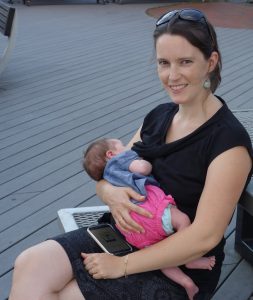If you are anything like me you obsessed about newborn sleep with your first baby. You read tons of articles and books and tried all different strategies to get your baby to sleep longer and on her own.
I read so many books and articles on newborn sleep the first time around. From gentle strategies to cry it out methods. I dabbled in them all, but nothing really changed the situation. I got frustrated almost daily with my baby’s sleep habits (i.e short naps. frequent night wakings, wanting to sleep in arms only). I struggled against my first born’s sleep habits well past her first birthday.
Eventually things got better, though sleeping through the night eluded us for much of the first three years.
These days I have a two month old and I find myself once again feeling uncertain and at times frustrated with her sleep habits, even though my expectations are much more realistic this time around. I expect her to take short naps and want to sleep in our arms or in a baby carrier. I expect her to wake up frequently at night.
She does both of these things.
It can definitely be annoying, but the difference is that I am not surprised by her behavior. I still feel like everyone else’s baby is sleeping better than mine (even though they’re not), but I’ve got perspective now. I know that there’s not much I can do to change her sleep habits and that eventually things will get better.
This is why there are just two newborn sleep resources I am interested in. These days I am much more interested in sleep resources that validate what’s going on in my life than those that try to change it. When I say that these two resources “change the game” I mean just that. They are not going to magically make your baby sleep any differently, but they just might shift your perspective. By changing the game from trying to fix baby to trying to fix your expectations you may find some peace with the situation…and maybe even some extra sleep.
***BIG CAVEAT here. These two resources are pro-breastfeeding and pro co-sleeping. These are two parenting techniques that have worked for me. I know not everyone can breastfeed. I know some choose not to. I know not everyone wants to co-sleep. I know some people can’t for various reasons. So feel free to disregard these resources if they don’t apply. I’m definitely not telling you what to do. This is what worked for me, read on if interested.***
Breastsleeping?!?!?!? What is that you say? Well I know exactly what it is. It’s when you fall asleep nursing your baby only to wake up some time later (minutes or hours) to a stirring baby who wants to nurse again (said baby may or may not be still attached to your breast).
This is an academic article people! You can read the whole thing here. It’s a little dense with academic jargon, but if you can wade through the funky language you will find references to some beautiful research being done on the importance of breastfeeding and the mother-infant bond.
Here’s a small excerpt:
Indeed, breastfeeding mothers find it difficult to keep their babies out of their beds, explicable by the fact that the mothers’ body remains the only environment to which the human neonate–infant is adapted [6]. This is a body (both behaviorally and in a physiological sense) that is incredibly responsive to and regulatory of the vulnerable human infant [6] and, assuming a smokeless gestation for the infant, when sober and committed it is ‘value added’ and not an inert lethal weapon over which the mother has no control nor to which her infant offers any feedback. This is a dramatic difference from the portrayals in current ‘Safe to Sleep’ campaigns in the United States, or the studies on which they are based, which analogize mothers to lifeless wooden rolling pins or metal cleavers.
This commentary piece highlights many other research articles that point to the positives of breastfeeding and bed-sharing. The authors provide arguments to discredit previous studies showing bed-sharing as an increased risk for SIDS. What this piece does well is point to the reality of parenting a newborn and trying to breastfeed.
Indeed, sometime during the first three months postpartum, many, if not most, breastfeeding mothers adopt bed-sharing (though not necessarily routinely, all night and every night), as it proves to be a successful means initially to solve latching problems and to manage their milk supply (stimulating lactogenesis); but bed-sharing also proves to be an effective way to reduce night-time infant crying, to settle babies and for both mother and infants to get more sleep, in addition to finding more emotional satisfaction by way of the stronger attachment such contact and proximity facilitates [6].
The piece ends with this little gem:
It is within this context that for breastfeeding mothers, the decision to bed-share proves often to be an unexpected ‘no brainer’ explaining why, perhaps, a quiet but seismic shift towards adopting bed-sharing in Western cultures, despite medical recommendations against it, is occurring as breastfeeding re-establishes itself in many Western countries as the cultural norm.
I will say that the decision to bed-share was not a “no-brainer” for me, and it came after many months of struggling against my baby’s sleep habits and needs. It was more of a surrendering and giving up. That is where my next resource comes in to help.
Sweet Sleep by Diane Wiessinger, Diana West, Linda J. Smith and Teresa Pitman
This is a La Leche League International Book that was published in 2014. The preface sums up the outlook of the book:
Baby care is about trade-offs – balancing your baby’s needs with your own needs and adapting “official” guidelines to your own situation rather than following every guideline at all costs…The dramatic departure that this book offers is to approach sleep safety via the management of risks to infants in different sleep scenarios. It offers a packaged method (called the Safe Sleep Seven) to help parents identify risks they should avoid, and to reassure those parents whose babies fall into the “minuscule risk” category.
This book is pro-breastfeeding and pro-co-sleeping – under the right circumstances. Even if you are doing neither though, this book can offer you some validation and peace of mind. Ok I’m back from re-reading some of my favorite sections of the book. Here are some section titles: Sleep Gadgets, Gentle Sleep Nudging Methods, Your Own Sleep Needs, Sleep Personalities and Places, Attatched and Attuned.
What I love about this book is that it acknowledges that babies are different and that babies have a biological need for frequent waking, feeding, and proximity to their care giver. Sweet sleep is a research based book that carefully articulates that many of our issues with newborn sleep come from a) our attempts to force babies to acclimate to our modern schedules, b) trying to adhere to sleep guide lines that aren’t aligned with newborn’s biological needs, and c) cultural norms about newborn sleep that are one sized fits all (or really none in this case).
This is NOT a “how to get your baby to sleep longer by themselves” book. This is a “this shit is really hard and here are some ideas to help you adapt and cope.” This book acknowledges over and over again that night waking is normal and often protective for infants. Sweet Sleep also validates that night waking, babies who refuse to sleep in cribs, and the constant neediness of many babies can be really challenging for new parents.
Whether you are breastfeeding, co-sleeping, bottle-feeding, or sleep-training, you can find something in this book. (Ok – it may be a stretch if you are Ferberizing). This is a very mother-baby centered book. I originally read it when my daughter was about 16 months old and felt tearful at many of the sections describing how beneficial it is to co-sleep and breastfeed. I felt like someone was giving me a huge pat on my back. It helped me push through a challenging stage of sleep with the knowledge that in the long-run I was doing something really great for my child.
I’ve been re-reading this book in pieces now that I have another baby and it offers little advice and much reassurance. It has helped me stay in the moment, accept my newborn’s sleep habits, and make safe choices to cope.
Newborn sleep will always have its challenges, but having good solid information about your baby’s biological needs and behavior can help you find peace with the reality of your situation. I appreciated these two resources because I connected with their message and because they validated my parenting reality.


